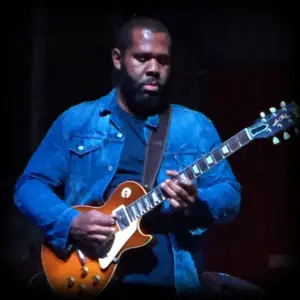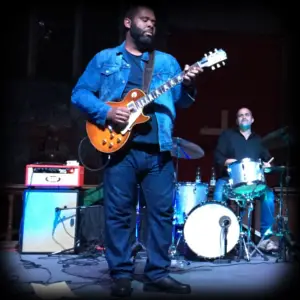Kirk Fletcher
 Kirk Fletcher is not the first blues guitar master whose early musical tutelage came through gospel music. But when the eight-year-old Kirk picked up his first guitar in his father’s church, he was – however unwittingly – following a time honored tradition of the blues.
Kirk Fletcher is not the first blues guitar master whose early musical tutelage came through gospel music. But when the eight-year-old Kirk picked up his first guitar in his father’s church, he was – however unwittingly – following a time honored tradition of the blues.
For many musicians growing up in the south, gospel music is and has always existed as an alternative to the blues, with gospel largely recognized as the ‘good’ choice and the blues being the ‘bad’ one. Which choice did young Kirk Fletcher make? Hardcore aficionados of the blues would insist he made the right one.
Further inspiration came for Kirk when he met Jeff Rivera, a guitar tech for bluesy rocker Robben Ford. Hanging out in a small guitar store in Los Angeles gave him a chance to help load gear and perform a few other tasks for Ford. Insisting that the sound of “Robben’s guitar will ring in my head forever,” Kirk Fletcher found himself addicted to this new sense of joy in his life. “I had nothing to do but play guitar.”
The time of giving his undivided attention to his true love in life paid off handsomely. In short order he had developed a tone and touch all his own. But his evolution as a blues guitar man wasn’t yet complete. First he had to be introduced to the blues.
The man who made the introduction possible was Al Blake. Best known as vocalist and harp master for a local outfit known as the Hollywood Fats Band. Al was happy to share his record collection with his friend as well as connect Fletcher with a number of stars of the blues world living nearby – among them were Richard “Lynwood Slip” Duran and Junior Watson. Kirk Fletcher was now a budding blues musician, exploding on the scene with appearances at gigs and later releasing an album of his own entitled I’m Here and I’m Gone.
 Yet another key introduction to the blues scene from Al followed. Kirk met Kim Wilson of the Fabulous Thunderbirds. Wilson had a project lined up that beautifully matched the young guitarist’s skills. The name of the project was Kim Wilson’s Blues Revue and Fletcher found himself touring the world with this dazzling new outfit. From there the chances for more life-changing experiences kept coming. Fletcher played on another of Wilson’s projects (the Grammy-nominated live album called Smokin’ Joint). Additionally, he got to play with a room full his blues heroes – namely, James Cotton, Hubert Sumlin and Pinetop Perkins.
Yet another key introduction to the blues scene from Al followed. Kirk met Kim Wilson of the Fabulous Thunderbirds. Wilson had a project lined up that beautifully matched the young guitarist’s skills. The name of the project was Kim Wilson’s Blues Revue and Fletcher found himself touring the world with this dazzling new outfit. From there the chances for more life-changing experiences kept coming. Fletcher played on another of Wilson’s projects (the Grammy-nominated live album called Smokin’ Joint). Additionally, he got to play with a room full his blues heroes – namely, James Cotton, Hubert Sumlin and Pinetop Perkins.
Next came another collaboration with a hero – Charlie Musselwhite. According to Fletcher the experience was key because, “This is where I really developed my own sound and Charlie was cool with me being me.”
What followed was three years on the road with the band and a slot on the album Paint It On.
My Turn, Fletcher’s third album demonstrates the kind of kind of maturity it often takes other musician’s decades to develop. It also features yet another bridge crossed in his career. First the first time ever, he was contributing vocals. With a live album (Burning Blues) now under his belt, Fletcher seems ready to conquer the world – not just the blues world.
